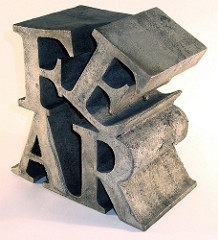A debt collector has the right to collect for unpaid bills. That makes sense, but misunderstanding about what a collector can and cannot do causes stress and fear.
 If you find yourself unable to keep up with at least the minimum payments due on your credit accounts, before long, those accounts may be turned over to a DEBT COLLECTOR!
If you find yourself unable to keep up with at least the minimum payments due on your credit accounts, before long, those accounts may be turned over to a DEBT COLLECTOR!
This may cause FEAR or STRESS, which is natural, but often unfounded!
Someone has called F.E.A.R. :
- False
- Evidence, that
- Appears
- Real
You may be in this situation as a result of...
- Unemployment
- Divorce
- Serious illness or Disability
- Trying to make ends meet on a limited, FIXED INCOME of retirement
- or other reasons beyond your control

What happens when you start missing the minimum payments due?
The original creditor will start trying to get you to start making payments again.
Each creditor (Visa, Master Card, Discover, Capital One, etc.) has slightly different processes for recovering past due debts, but all take pretty much the same approach:
They send out letters encouraging you or kind of demanding you to start making payments or even warning you that unless you do "such-n-such", they will escalate their collection efforts to the next level.
And then the calls start. Lots of calls!
If you somehow have the funds available to catch up, then you may want to contact them and see what can be done, but.......
DO NOT GO INTO MORE DEBT TO PAY OFF THESE DEBTS!
"Robbing Peter to Pay Paul" just results in more and more problems!
However, if you don't have the money to pay your debts (and you probably are in this situation because you just can't keep up), then it is usually best not to bother contacting them and trying to explain your situation.
NEVER FORGET...
Credit card companies are in business for one reason and one reason only, and that is to make HUGE PROFITS!
These profits come from:
- INTEREST
- ENROLLMENT FEES
- ANNUAL FEES
- OVER-THE-LIMIT FEES
- LATE FEES
...and about anything else they can tack on to get more money from us!
OK, then what happens next?
After about 3-4 months, if the calls and letters don't work to get you to start sending them money, they will usually:
- Charge the account off as a loss
- Assign it to a collection agency
- Sell the account to a DEBT BUYER (Yes there are hundreds of companies that BUY Millions if not Billions of dollars of debt!), or...
- Retain a LAW FIRM that specializes in debt collection
Now these other agencies begin to contact you by mail and phone.
While your account is still with the original creditor, they have the right (in the fine print of the application) to call you.
But once these accounts are transferred or sold to another party, you have the legal right to stop them from calling
But, whether these companies are working on a commission basis or have purchased the account, their goal is the same...
GET YOU TO PAY THEM $$$$ !
Depending on your particular situation, you may be able to accept or negotiate a SETTLEMENT.
In fact, they may mail you an offer or you can call and try to negotiate.
A SETTLEMENT is an agreement to accept an amount less than the full balance.
Once this settlement is completed (lump sum or in payments), the account is deemed "settled-as-agreed" or "settled for less than the full balance" and it will be reflected as a ZERO or $0 Balance on your CREDIT REPORT.
If you'd like to know more on how DEBT SETTLEMENT affects your CREDIT SCORE, CLICK HERE:
But what if you don't have the funds necessary to accept to negotiate a settlement offer?
The collection agency may be patient and keep the account on file for several months.
Or...
The original creditor may RECALL the account and RE-ASSIGN it to another collection agency.
If this happens, then the LETTERS and CALLS will start again. You'll have to follow the same procedure to STOP THE CALLS.
But...
Sometimes your account lands with a Law Firm that specializes in DEBT COLLECTION.
This firm will send the letters and make the calls, but if no agreement can be reached, they may start the LEGAL PROCESS to collect.
A CLAIM will be filed with the COURT in the county where you reside.
A SUMMONS will be delivered to you. It will state that you have 20 or 30 days (varies by state) to APPEAR and give an ANSWER to the court.
Sounds like you have to go to court within that time-frame or else!!!!
Good time to give disclaimer:
I am not an attorney and am not nor cannot give legal advice. My comments are just my opinion gained over many years of helping people deal with debt. If you have concerns, please consult an attorney.
"Appear and give and Answer":
If you have clear proof (payment stubs, bank records, etc.) that prove that you DO NOT owe the debt that the PLAINTIFF (creditor or owner of the debt) CLAIMS you owe, then you have the 30 days or so to file your ANSWER with the court.
This ANSWER must be in the proper, legal form your county court demands and usually it is best to have an attorney prepare it and file with the court.
Of course, this takes more money, so don't even start if you cannot prove (no question) that you DO NOT OWE THE DEBT!
But what if you owe the debt the SUMMONS says you owe?
Then you need to contact the attorney's office and try to negotiate either a SETTLEMENT or a REPAYMENT agreement!
DO NOT IGNORE THE SUMMONS ! ! !
If an agreement cannot be arranged in about 2-3 months, then the attorney will probably apply for a JUDGMENT by DEFAULT. (No one filed an ANSWER), so they win by default.
Many people think that if you get behind on your bills that a creditor can just TAKE MONEY OUR OF YOUR BANK ACCOUNT, GARNISH YOUR WAGES or put a LIEN on your home or other property.
NO, NO, NO ! ! !
A creditor, debt collector or attorney cannot just take your money or property!
I hope you are starting to understand that there is a whole lengthy, legal process that has to take place before that could possibly happen!
HOWEVER, VERY IMPORTANT...
If you owe taxes, child support, alimony or some other debts, then your bank account, wages and liens can be done without all the above process!
If your creditor (plaintiff) has been awarded a judgment, now they can apply for a wage garnishment, bank levy or place a lien on your home or other property.
WAGE GARNISHMENT
If you have EARNED INCOME (not Social Security or other Retirement income) then it can be subject to garnishment per the judgment.
In most states, this is usually about 25% of your net (after tax) income.
BANK GARNISHMENT
Once the plaintiff is awarded a Judgment, they can search for you bank accounts.
This is usually done by using your social security number.
In 2011, a law was passed to protect consumers from incorrect bank levies.
If you bank receives a court order to "freeze" you bank account due to a judgment, the bank is required to follow laws on what they can and cannot do.
However, not all banks do so and this can result in a very frustrating situation. To learn more, click here:
Bank Laws Concerning Levies and Garnishments
PROPERTY LIEN
One of the most misunderstood options a creditor has for collecting a debt (REMEMBER: ONLY AFTER A JUDGMENT IS AWARDED!) is a LIEN.
If a lien is placed on your home, is DOES NOT MEAN that you have to sell your home to pay the debt!
A LIEN is basically a plaintiff taking a position (usually behind a first or second mortgage) on your home.
If you home is paid for, then they would have first position.
What does this mean?
It means that when you go to sell or transfer ownership (give to your children after your death as an example), the amount of the judgment must be paid.
Example:
If you sell the house for say $250,000 and the judgment balance is $20,000, the title company will have to send $20,000 to the plaintiff at closing.
That's why they do a "Title search" when you are buying/selling/refinancing a house in order to see if there are any LIENS.
In this example, you would net $225,00 and the Lien is removed from court records.
OK, let's review:
Can a creditor take anything you own without being awarded a judgment?
NO!
If you receive a SUMMONS, do you have to go to court?
NO!
If you receive a SUMMONS, can you still negotiate a settlement or a repayment agreement to stop any other legal options a creditor may have?
YES!
Can a creditor take money out of your bank account without being awarded a judgment?
NO!
Even after being awarded a judgment, can a creditor take money from your bank account that comes from:
- social security
- disability
- retirement
- child support, or
- alimony.
No !
Hope this helps.








